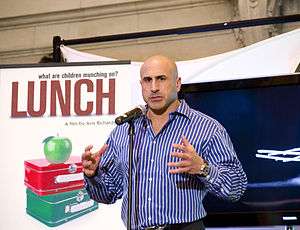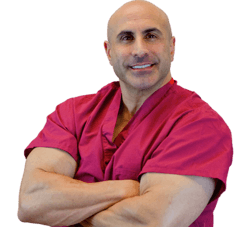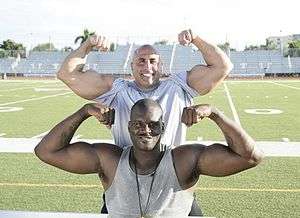Carlon Colker

Carlon M. Colker (born June 21, 1965) is an American physician and dietary supplement industry consultant. He runs a private practice and consulting company in Greenwich, Connecticut (Peak Wellness, Inc.), and served as chief medical officer and executive vice president for the dietary supplement company Atlas Therapeutics (now doing business as MYOS Corp.). He has also served as a researcher, product developer, and spokesman for other supplement companies including LifeVantage, ITV Ventures, Cytodyne Technologies, Muscletech Research and Development, Metabolife International, and Vital Basics.
In 2003, Colker sparked media controversy by attempting to defend the safety of ephedra-based supplement products, which he had previously been involved in researching on behalf of various manufacturing companies,[1][2][3][4][5] and he was a defendant named in lawsuits filed in multiple U.S. states alleging that research he conducted on behalf of the ephedra supplement manufacturers Cytodyne Technologies and Metabolife was fraudulent; that he had altered test results, and that he had attempted to hide dangerous adverse reactions suffered by research subjects.[1][2][6][7][8][9][10] In 2004 Colker’s research and radio commercials for V-Factor, a dietary supplement that was claimed to enhance male sexual performance, were the focus of a false advertising complaint from the U.S. Federal Trade Commission which resulted in the manufacturer, Vital Basics, Inc., paying out a $1-million settlement.[11][12][13]
In 2007, Colker appeared as a guest physician and trainer on the ABC reality TV program Shaq's Big Challenge.[14] In 2008, Colker made news headlines after advising actor Jeremy Piven to prematurely withdraw from David Mamet's Broadway play Speed-the-Plow due to concerns of alleged mercury poisoning from consuming excessive amounts of sushi and Chinese herbal supplement products.[15][16][17][18]
Early life
Colker was born to parents of Russian Jewish and Lithuanian descent. Both of them were artists. His father, Edward Colker, was a graduate of New York University, a noted lithographer, a maker of rare hand-bound books, and a Guggenheim Fellowship recipient.[19] His mother, Elaine Galen, was a graduate of the University of Pennsylvania and an abstract painter. As a child, Colker grew up around the diversity of his parent’s art world while being exposed to their penchant for healthy living, organic foods, and vitamin supplements.
Education
Colker received a baccalaureate degree in June 1988 from Manhattanville College in Purchase, New York. He received his medical degree in May 1993 from Sackler School of Medicine. From 1993 to 1996, he received residency training in internal medicine at Beth Israel Medical Center in Manhattan, New York.[20]
Professional

In 1996, Colker was employed first at Park Avenue Medical Nutrition and then later that year, by Affiliated Physicians, both located in New York City. In January 1996 he established Peak Wellness, Inc., a company with locations in Greenwich, Connecticut and Beverly Hills, California that provides integrative medical services including diet and nutrition guidance, physical therapy and injury rehabilitation, exercise testing and physical performance optimizing, as well as preventive medicine and anti-aging interventions. Colker is an affiliate of Greenwich Hospital in Greenwich, Connecticut.[21] and is an attending physician in the Department of Medicine at Mount Sinai Beth Israel Hospital in New York City.[22] Colker also serves as a voluntary faculty member (clinical assistant professor of medicine in neurology) at Weill Cornell Medical College in New York City.[23]
In February 2011, Colker served as chief medical officer and executive vice president of Atlas Therapeutics Corp.[24] (OTCBB: ATTH; formerly Marvin's Place, Inc.; dba MYOS Corp. as of May 2012; OTCBB:MYOS[25]). In June 2012, Colker resigned his position and became a member of the company's scientific advisory board.[26] In 2008, it was announced that Colker would be serving on the advisory board[27] of the supplement manufacturing company LifeVantage. In 2005, Colker was named as head of the scientific advisory board of the dietary supplement manufacturer Health Sciences Group, Inc. (OTCBB:HESG),[28] and in 2006 the company announced that Colker would be assisting in the formulation of the supplement product Sequestrol.[29] Colker was also a product developer and spokesperson for the dietary supplement Lipistat, marketed by ITV Ventures.[30] He has served as a spokesperson, adviser, product developer, and/or researcher for the supplement companies Cytodyne Technologies, Inc., Muscletech Research and Development, Metabolife International, Inc., and Vital Basics, Inc. Colker has also served as a Health and Nutrition Consultant for Fairway Market, an American grocery chain.[31]
Dietary supplement controversies
Ephedra
Colker has generated controversy regarding his public comments and research on the safety of ephedra-based dietary supplements. Colker was the lead researcher responsible for studies and product development on behalf of supplement manufacturers such as Cytodyne Technologies, Inc.,[1][32][33][34] Muscletech Research and Development,[35] and Metabolife International, Inc., manufacturers of the ephedra-based weight loss pills Xenadrine RFA-1, Hydroxycut, and Metabolife 365, respectively.[2][24]
Following the February 2003 heatstroke-related death of Baltimore Orioles pitcher Steve Bechler, in which ephedra was implicated as the cause,[36] Colker and two other physicians, all speaking on behalf of the industry-affiliated Ephedra Education Council, disputed the role that ephedra played in Bechler’s death.[3][4] Colker also downplayed the dangers of ephedra, claiming that it "is not a health risk for most people".[5]
In May 2003, a California Superior Court judge handed down a $12.5 million judgment in a class action suit against Cytodyne Technologies for falsely advertising Xenadrine RFA-1, the product implicated in the death of Bechler. Colker had been enlisted by Cytodyne to conduct a clinical study on the effectiveness of Xenadrine RFA-1, and upon the study’s completion, the company paid Colker approximately $5,000 to field calls from customers and make conference appearances.[1] Referring to Colker's research, the judge noted that Colker lacked credibility[1] and concluded that Cytodyne had "not just exaggerated the findings of the clinical trials it commissioned, but had also cajoled some researchers into fudging results", and that those involved in the research on Xenadrine RFA-1 had set out "to create a study that justified the money being spent by Cytodyne and that would ensure that they received further work from the company". Journalists for the New York Times commenting on Cytodyne's research noted that the legal case raised "serious questions about the way makers of ephedra and other dietary supplements use -- and often misuse -- the promise of scientific proof to market their products".[2]
During 2003, Colker was named as a defendant in lawsuits filed in Missouri, West Virginia, and Illinois in connection with his involvement in the research and marketing of Hydroxycut and Xenadrine RFA-1. The lawsuits alleged that Colker and his Greenwich clinic, Peak Wellness Inc., ran fraudulent tests, altered test results, and hid dangerous adverse reactions suffered by test subjects.[6][7][8][9][10][37] In July 2003, Colker was called to testify before a United States House Committee on Energy and Commerce investigating deaths and adverse events stemming from ephedra supplements for which Colker had been involved in researching and marketing.[32][33]
V-Factor
Colker previously served as a researcher and television spokesperson for “V-Factor” (a combination of yohimbine, L-arginine, and Gingko biloba), a dietary supplement marketed by Vital Basics, Inc. of Portland, Maine as a men’s sexual performance enhancer. In 2004, the U.S. Federal Trade Commission registered a complaint against Vital Basics and its owners[11][12] alleging, in part, that the company’s advertising of V-Factor violated Federal law; specifically, that the company made unsubstantiated claims about V-Factor’s safety; falsely represented that a clinical study of V-Factor conducted by Colker proved that the product was safe and effective; and misrepresented paid commercial advertising featuring Colker (Vital Basics Health Show radio infomercials) as independent radio programs. The defendants settled the FTC’s complaint by paying $1 million for consumer redress and agreeing not to make unsubstantiated claims in the future.[13][38]
MYO-X/MYO-T12
In January 2015, Entertainment Tonight reported that entertainer Justin Bieber had credited Colker with recommending MYO-X, a dietary supplement that Bieber had allegedly used in preparation for a Calvin Klein underwear photo shoot.[39] Bieber was criticized for “…hyping Colker’s latest “miracle” supplement MYO-X, to his 59 million Twitter fans.”[40]
SEC documents filed by the manufacturer (MYOS Corp.; dba Atlas Therapeutics until May 2012), indicate that the product consists of a powder isolated from the yolk of fertilized chicken eggs. It was developed by Colker in 2005 as a supplement formulation that was marketed initially under the trade name Folstaxan by Celldyne Biopharma LLC and, subsequently, under the trade name MYO-T12 by Atlas/MYOS.[26][41][42][43][44] The product was implied to contain follistatin and to increase muscle mass by inhibiting myostatin.
In February 2011, Colker sold the marketing rights and trademarks for MYO-T12 to MYOS for $1.15 million and entered into a three-year employment agreement to serve as the company’s Chief Medical Officer and Executive vice-president, resigning in 2012 to serve as a scientific advisor for the company in exchange for 300,000 shares of common stock.[41][42][45] Under the terms of licensing agreements with MYOS, MYO-T12 is distributed by Maximum Human Performance (MHP) under the brand name MYO-X, and by Cenegenics (NASDAQ:CELG) under the brand name Cenegenics Muscle Formula (Fortetropin).[41][46][47]
Myostatin inhibitors are specifically banned by the World Anti-Doping Agency (WADA).[48] In an August 12, 2012 interview with National Public Radio, Colker stated “when the myostatin inhibitors come along, they'll be abused. There's no question in my mind.”[49]
Jeremy Piven and mercury poisoning
In December 2008, actor Jeremy Piven announced that he would be withdrawing from the lead role as Bobby Gould in David Mamet’s Broadway play Speed-the-Plow. Piven, who had previously sought an early release from the production, cited mercury poisoning from eating sushi and taking herbal supplements as the reason for his decision to leave the show prematurely.[15] Colker, who said that Piven had come to him soon after the show had opened and complained of excessive fatigue and exhaustion, was responsible for making the diagnosis and providing Piven with medical advice that “he should end his run immediately.” According to a letter sent by Colker to the show’s producers, he stressed that “it’s important to underscore that” withdrawing from the play was not Piven’s decision and said “it was my decision.” Writers for the magazine Variety and Gawker expressed skepticism about the legitimacy of Piven’s excuse for withdrawing from the play,[16][17][18] and Mamet wryly commented “my understanding is that he is leaving show business to pursue a career as a thermometer.”[15][50] The producers of the show pursued grievance and arbitration hearings through the Actors Equity union.[51][52][53] The arbitrator in the dispute, George Nicolau, ruled in Pevin’s favor in August 2009. Commenting on the ruling, producer Jeffrey Richards stated “while we were disappointed with the arbitrator’s decision, we accept it and have put the matter behind us.”
Media Appearances

Colker appeared as a guest physician and trainer on the ABC reality TV program Shaq's Big Challenge.[14] In a 2013 Twitter post, Shaquille O'Neal stated "Back w Carlon Colker, M.D. again, my personal physician and trainer of nearly 20 yrs!"[54]
In 2008 Colker promoted the inaugural National Family Fitness Day.[55] Colker appeared in the 2008 movie Bigger, Stronger, Faster.[56] and narrated the 2010 documentary short film LUNCH, which investigated the causes and consequences of children growing up in a junk-food culture.[57]
Books
- Extreme Muscle Enhancement: Bodybuilding’s Most Powerful Techniques (1st edition). Prosource Publications, Inc.; Manasquan, N.J.,; January 9, 2005.
- The Greenwich Diet, Advanced Research Press, Ronkonkoma, New York; Publication: May 1, 2000.
- Sex Pills: From Androstenedione to Zinc, What Works and What Doesn’t, Advanced Research Press, Ronkonkoma, New York; Publication: March 1, 1999.
References
- 1 2 3 4 5 Nathan, Vardi (April 19, 2004). "Poison Pills". Forbes. Retrieved November 27, 2011.
- 1 2 3 4 Fessenden, Ford (June 23, 2003). "Studies of Dietary Supplements Come Under Growing Scrutiny". New York Times. Retrieved November 26, 2011.
- 1 2 Kemper, Vicki (February 21, 2003). "Ephedra Industry Insists Herb Is Safe". Los Angeles Times. Retrieved November 26, 2011.
- 1 2 Morgan, Jon (February 21, 2003). "Ephedra link to death disputed by industry". Baltimore Sun. Retrieved November 27, 2011.
- 1 2 "How Safe Is Weight-Loss Supplement Xenadrine?". Good Morning America. Retrieved November 26, 2011.
- 1 2 "Connecticut: Greenwich: Diet Doctor Sued". New York Times. June 9, 2003. Retrieved November 2, 2015.
- 1 2 "Greenwich Doctor Named in Ephedra Suits". Natural Products Insider. July 21, 2003. Retrieved November 2, 2015.
- 1 2 "Diet book author taken to court". The Hour. June 7, 2003. p. 53. Retrieved November 2, 2015.
- 1 2 Fessenden, Ford (June 23, 2003). Studies of Dietary Supplements Come Under Growing Scrutiny. New York Times.
- 1 2 Crabtree, Penni (May 31, 2003). "Judge tells N.J. diet pill firm to pay restitution". San Diego Union-Tribune May 31, 2003. Archived from the original on May 31, 2006. Retrieved August 21, 2014.
- 1 2 "Vital Basics, Inc., et al.; Analysis To Aid Public Comment". Federal Trade Commission. March 23, 2004. Retrieved 2004-03-23.
- 1 2 "Decisions, Findings, Opinions, and Orders, January 1, 2004 To June 30, 2004. Vital Basics, Inc., et al. (Docket C-4107)" (PDF). Federal Trade Commission. p. 254. Retrieved December 1, 2011.
- 1 2 "Marketers of the Supplements "Focus Factor" and "V-Factor" Agree to Settle FTC Charges and Pay $1 Million". Federal Trade Commission. March 17, 2004. Retrieved December 1, 2011.
- 1 2 Alipour, Sam. "Shaq battles fat -- and no, not his own". ESPN Sports. Retrieved December 1, 2011.
- 1 2 3 Itzkoff, David (December 18, 2008). "Piven Leaves Show Amid Concerns for His Health". New York Times. Retrieved November 28, 2011.
- 1 2 Michael Fleming; Gordon Cox (December 18, 2008). "Macy, Butz replace Piven in 'Plow'". Variety. Retrieved November 28, 2011.
- 1 2 "Meet Mercury-Poisoned Jeremy Piven's Fishy Celebrity Doctor". Gawker. Archived from the original on May 21, 2012. Retrieved November 28, 2011.
- 1 2 "Jeremy Piven's Will Repeat His Mercury Poisoning Story Until You Think It's True". Gawker. Archived from the original on May 21, 2012. Retrieved November 28, 2011.
- ↑ International Print Collectors' Society Newsletter Archived July 27, 2011, at the Wayback Machine. January 2005, Vol II, Issue III
- ↑ "Residency Appointments" (PDF). sacklermedicine.us. Sackler School of Medicine. Archived from the original (PDF) on April 6, 2016. Retrieved November 2, 2015.
- ↑ "Find A Doctor: Carlon Colker, M.D.". Greenwich Hospital. Retrieved November 26, 2011.
- ↑ "Physician Directory Listing: Carlon Colker, MD". Mt.Sinai Beth Israel. Retrieved August 24, 2015.
- ↑ "Find Faculty: Carlon Colker, M.D.". Weill Cornell Medical College. Retrieved August 19, 2015.
- 1 2 "Carlon M. Colker Bio". Forbes. Retrieved November 26, 2011.
- ↑ "Press Release: Atlas Therapeutics Changes Its Name and Ticker Symbol to MYOS Corporation and "MYOS"; Launches New Corporate Website". MYOS Corporation. May 21, 2012. Retrieved September 17, 2015.
- 1 2 "MYOS Corp. Registration Statement". October 15, 2014. Retrieved September 17, 2015.
- ↑ "Colker joins LifeVantage scientific advisory board". The Daily Transcript, San Diego Source. October 8, 2008. Retrieved November 26, 2011.
- ↑ "Press Release: Carlon Colker, M.D., Appointed to Head Scientific Advisory Board; Reports Second Quarter Results and Recaps Recent Developments". Business Wire. August 23, 2005. Retrieved December 7, 2011.
- ↑ "Press Release: Health Sciences Group Announces Strategic Initiatives for 2006". Business Wire. January 6, 2006. Retrieved December 7, 2011.
- ↑ "Lipistat: Quick Reference Sheet" (PDF). ITV Ventures. Retrieved December 7, 2011.
- ↑ http://blog.fairwaymarket.com/about-our-authors/
- 1 2 "Issues Relating to Ephedra-containing Dietary Supplements". House Committee on Energy and Commerce. July 23, 2003. Retrieved 2015-10-02.
- 1 2 "Ephedra Dietary Supplement (Day 1 Part 2)". CSPAN. July 23, 2003. Retrieved November 2, 2015.
- ↑ Kalman DS, Colker CM, Shib Q, Swain MA (April 2000). "Effects of a weight-loss aid in healthy overweight adults: double-blind, placebo-controlled clinical trial". Current Therapeutic Research. 61 (4): 199–205. doi:10.1016/S0011-393X(00)89034-7. Retrieved November 2, 2015.
- ↑ Colker, Carlon; Georgeann C. Torina; Melissa A. Swain; Douglas S. Kalman. "Double-blind, placebo controlled evaluation of the safety and efficacy of ephedra, caffeine, and salicin for Short term weight reduction in overweight subjects" (PDF). American Society of Exercise Physiologists, 2nd Annual Meeting, 1999 – Abstract # 26. Archived from the original (PDF) on 2012-04-25.
- ↑ Chass, Murray (March 14, 2003). "Baseball: Pitcher's Autopsy Lists Ephedra as One Factor". New York Times. Retrieved November 28, 2011.
- ↑ Crabtree, Penni (March 6, 2003). "Suit involving ephedra pill alleges fraud". San Diego Union-Tribune. Retrieved November 2, 2015.
- ↑ "Federal Register Vol. 69(56): Notices" (PDF). Federal Trade Commission. March 23, 2004. Retrieved 2014-07-18.
- ↑ http://www.etonline.com/fashion/155940_justin_bieber_reveals_his_calvin_klein_workout/
- ↑ http://www.theimproper.com/117405/justin-bieber-hypes-sketchy-diet-doctors-miracle-body-building-drug/
- 1 2 3 "MYOS Corp. SEC Form 10-K". December 31, 2014. Retrieved September 17, 2015.
- 1 2 "MYOS Corp. Prospectus". November 9, 2012. Retrieved September 17, 2015.
- ↑ "MYOS Corp SEC Form 10-K" (PDF). March 31, 2011. Retrieved September 17, 2015.
- ↑ Colker, C (June 2009). "Effect on serum myostatin levels of high-grade handled fertile egg yolk powder". J Am Coll Nutr. 28 (3): Abstract #47.
- ↑ "MYOS Corp. Intellectual Property Purchase Agreement". February 25, 2011. Retrieved September 17, 2015.
- ↑ "Cenegenics Elite Muscle Formula". Archived from the original on October 12, 2015. Retrieved September 17, 2015.
- ↑ "United States District Court for the District of New Jersey. Docket No.: 15-448 MYOS Corp. v. Maximum Human Performance, LLC". Feb 19, 2015. Retrieved September 17, 2015.
- ↑ http://list.wada-ama.org/list/s4-hormone-and-metabolic-modulators/#myostatin%20inhibitors
- ↑ http://www.npr.org/sections/health-shots/2013/08/12/210487410/new-muscle-drugs-could-be-the-next-big-thing-in-sports-doping
- ↑ Marikar, Sheila (December 19, 2008). "Piven's Doc: If You See Him Eating Seafood, Call My Office". ABC News. Retrieved November 28, 2011.
- ↑ Healy, Patrick (October 8, 2009). "An Inside Look at an Offstage Drama". New York Times. Retrieved September 25, 2015.
- ↑ Healy, Patrick (October 9, 2009). "The Ruling for Jeremy Piven 12:11 PM". New York Times. Retrieved September 25, 2015.
- ↑ http://documents.nytimes.com/pulling-back-the-curtain-on-a-broadway-dispute#p=1
- ↑ O'Neil, Shaquille. "SHAQ Twitter Page". https://twitter.com/SHAQ/status/312272820430331904. Twitter. Retrieved 16 July 2014. External link in
|website=(help) - ↑ "Xbox 360 and Boys & Girls Clubs of America Team Up for First National Family Fitness Day". childrensaidsociety.org. Retrieved 2 August 2014.
- ↑ "Bigger, Stronger, Faster". http://www.imdb.com/. IMDB. Retrieved 2 August 2014. External link in
|website=(help) - ↑ http://www.imdb.com/title/tt1684908/